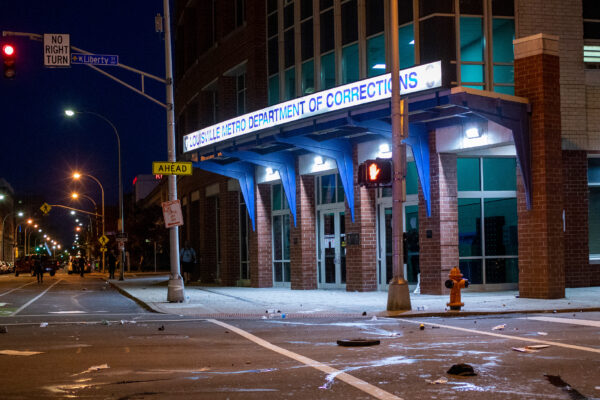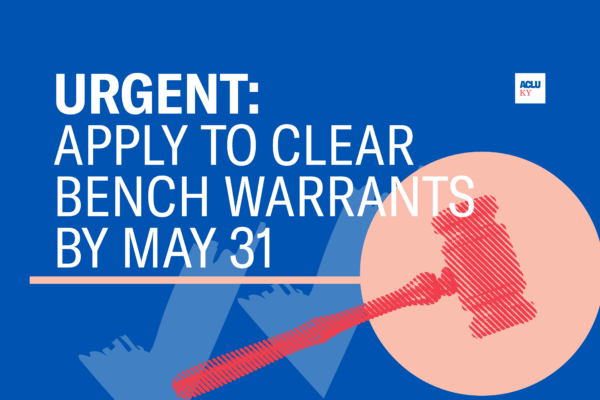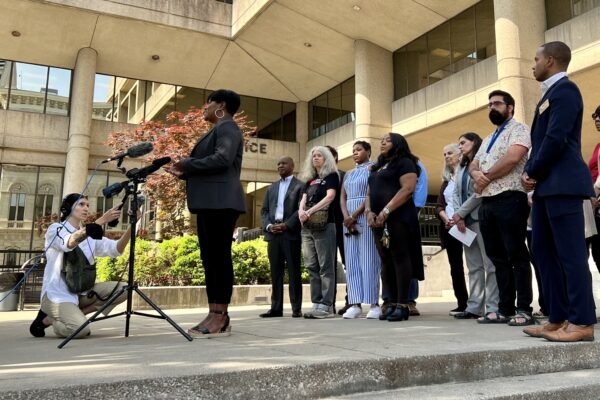Detaining a person in Louisville Metro Department of Corrections (LMDC) could be a death sentence, as evidenced by eight preventable deaths in just the past seven months. The jail is overcrowded, understaffed, and ill-equipped to address the needs of those who are held there.
One cause of this deadly overcrowding is a type of warrant called a bench warrant. There are thousands of active bench warrants that have been issued by Jefferson County District Court against people who have missed a court date. This means someone could be arrested and incarcerated simply because they did not make it to court one day. For instance, a person may have missed a court date for minor drug possession charges, have a bench warrant issued, and then be arrested on that bench warrant if they are pulled over for a broken taillight.
To address this problem, several community organizations have successfully gotten the Justice Partners (which includes the County Attorney, Commonwealth Attorney, Judges, and Circuit Court Clerk’s office) to offer an amnesty period for people with an active bench warrant. These people can apply to have their warrant set aside and reschedule their case free of charge. The deadline to apply is May 31, 2022. If people apply and are deemed eligible for amnesty, they will be given a new court date and must appear in person on their court date for the bench warrant to be set aside. After completing the process, they will no longer face the threat of arrest for a past failure to appear in court. People eligible for amnesty must have a bench warrant from Jefferson County District Court for a non-violent offense and/or class D non-violent felony offense. Anyone who may qualify should visit ACLU-KY.org/Amnesty to learn more and apply by May 31.
Many people face challenges getting to court, from finding childcare to getting time off work to using safe transportation. Instead of addressing these underlying problems, courts often issue bench warrants which further entangle people in the criminal legal system. There are currently 345 bench warrants that are active only because someone owes restitution, meaning the defendant owes money to someone to clear their case.
Most bench warrants are issued for the lowest level offenses and simply create a cycle of incarceration that harms the people involved and costs taxpayers even more. One person has had to appear in court 15 times over a case involving restitution of only $12.99, and another has had 43 court appearances over $50 in restitution. People should be given a fair chance to correct their wrongs; the answer is not repeated arrests that clog our courts, pack our jails, separate people from their families, and cost taxpayers exponentially more than the original offense ever would have.
Local organizations have long advocated for amnesty. A collective of organizations that came together to advocate for change in LMDC identified clearing bench warrants as one of many actions that could reduce deadly incarceration rates and reduce the number of unresolved cases in our courts. Public Defenders will be on hand to represent individuals that sign up for the Amnesty Docket. Community partners are offering transportation and childcare support, call 502-272-0056 for more information. There’s also an effort underway to raise money for restitution to help folks resolve their cases.
On a personal level, this amnesty period will allow people with certain active bench warrants to reschedule their case and potentially get it resolved on that date. This will allow them to live without the threat of immediate arrest should they encounter law enforcement. On a broader scale, clearing these bench warrants will reduce incarceration rates and alleviate deadly overcrowding at Louisville Metro Department of Corrections.
Why Amnesty? Why Now?
Louisville community groups have long advocated for an amnesty period. This action is urgently needed after eight people died in roughly the last six months in jails run by Louisville Metro Department of Corrections. Last fall, the ACLU of Kentucky came together with several other groups, including the Louisville Urban League, the Coalition for the Homeless, The Bail Project, Black Lives Matter Louisville, the Kentucky Alliance Against Racist and Political Oppression, and Louisville Showing Up for Racial Justice, to urge local officials to adopt community-based solutions. The group identified clearing bench warrants as one of many actions that could reduce deadly incarceration rates and reduce the number of unresolved cases in our courts.
Clearing bench warrants and giving people the opportunity to close their cases will reduce incarceration and save lives. Bench warrants are typically issued after a person does not appear for a scheduled court appearance or does not pay fines, fees, or restitution. Many people miss court dates because of barriers to transportation, childcare, time off work, and more. When a person has an active bench warrant, police are authorized to arrest them if they come into contact with the person. That means getting pulled over for speeding could lead to an arrest and incarceration.
On a personal level, this amnesty period will allow people with certain active bench warrants to reschedule their hearings and close their case. This will allow them to live without the threat of immediate arrest should they come into contact with law enforcement. On a broader scale, clearing these bench warrants will reduce incarceration rates and alleviate deadly overcrowding in jails run by Louisville Metro Department of Corrections.



